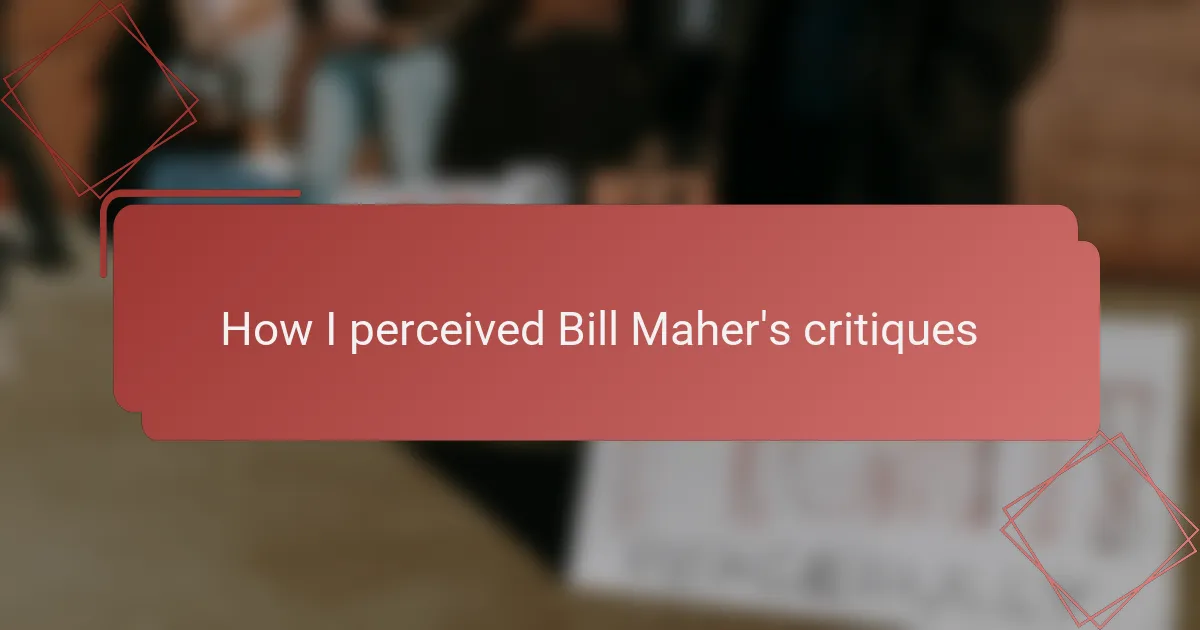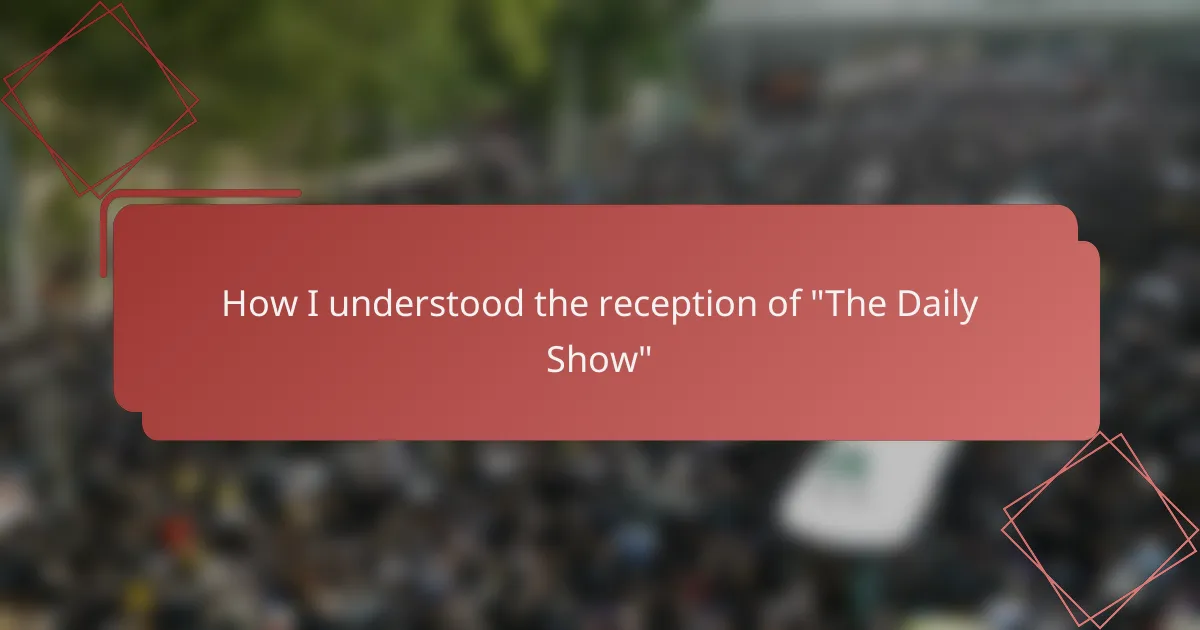Key takeaways
- Bill Maher’s satire effectively blends humor and critique, encouraging audiences to question political narratives while being entertained.
- His fearless approach tackles sensitive subjects, provoking thought and debate across the political spectrum.
- The effectiveness of his satire lies in its ability to raise uncomfortable questions and promote critical thinking.
- Maher’s style emphasizes a conversational tone, making complex issues more relatable and fostering dialogue.
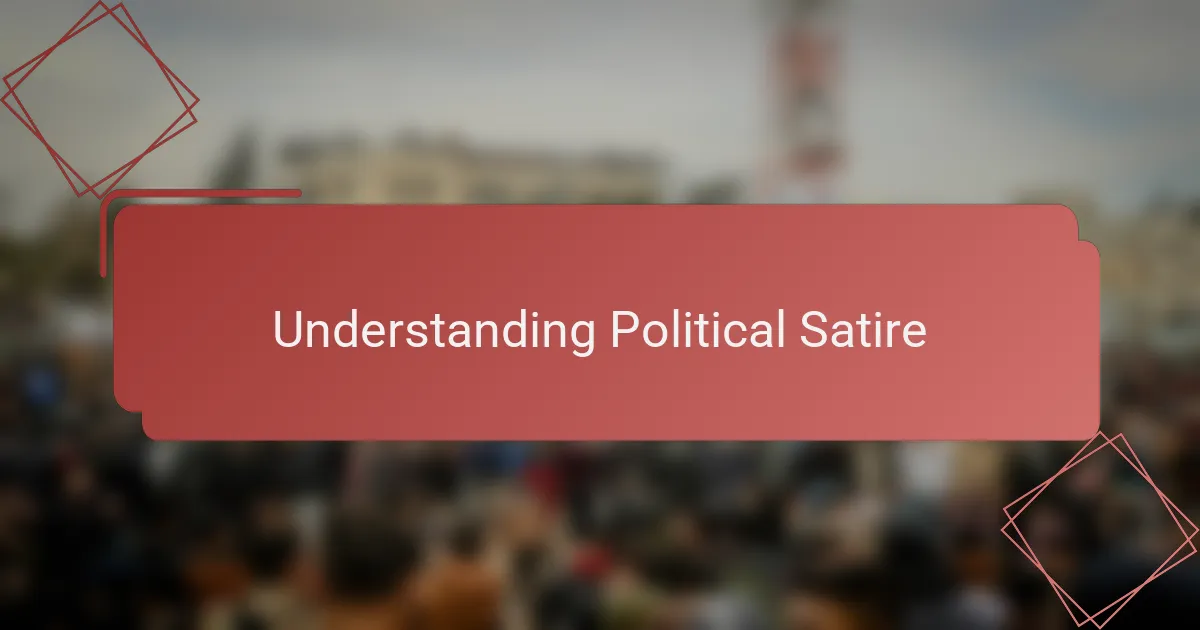
Understanding Political Satire
Political satire often walks a fine line between humor and critique, and I’ve found that understanding this balance is key to appreciating Bill Maher’s work. His critiques rely heavily on irony and exaggeration, tools that compel viewers like me to question political narratives while being entertained. It’s this mix of wit and insight that keeps me engaged, even when I don’t always agree with his point of view.
From my experience, political satire is more than just making jokes; it’s about holding power accountable through sharp observation. Here’s what I’ve noticed about how satire functions, especially in Maher’s critiques:
- Uses humor to make complex political issues more accessible
- Employs sarcasm to highlight hypocrisy or contradictions
- Blurs the line between comedy and commentary for deeper impact
- Provokes thought and discussion rather than just laughter
- Reflects personal biases and societal frustrations in its tone
These elements helped me understand that Maher’s satire is as much about challenging the audience as it is about lampooning politicians.

Key Elements of Bill Maher’s Humor
Bill Maher’s humor strikes me as sharp and unapologetic, often blending satire with incisive political commentary. His ability to challenge societal norms while making me laugh has always felt like a refreshing way to engage with heavy topics without feeling overwhelmed. I recall watching one of his monologues where his boldness made me simultaneously cringe and nod in agreement—that balance is a hallmark of his style.
What stands out most in Maher’s comedic approach is his fearless confrontation of sensitive subjects. He doesn’t shy away from controversy; instead, he uses it to provoke thought and spark debate. This quality makes his humor both entertaining and intellectually stimulating to me.
- Use of irony and sarcasm to highlight political hypocrisy
- Incorporation of current events with witty observations
- A conversational tone that feels like a candid discussion
- Willingness to challenge all sides of the political spectrum
- Blending humor with personal opinions to deepen impact
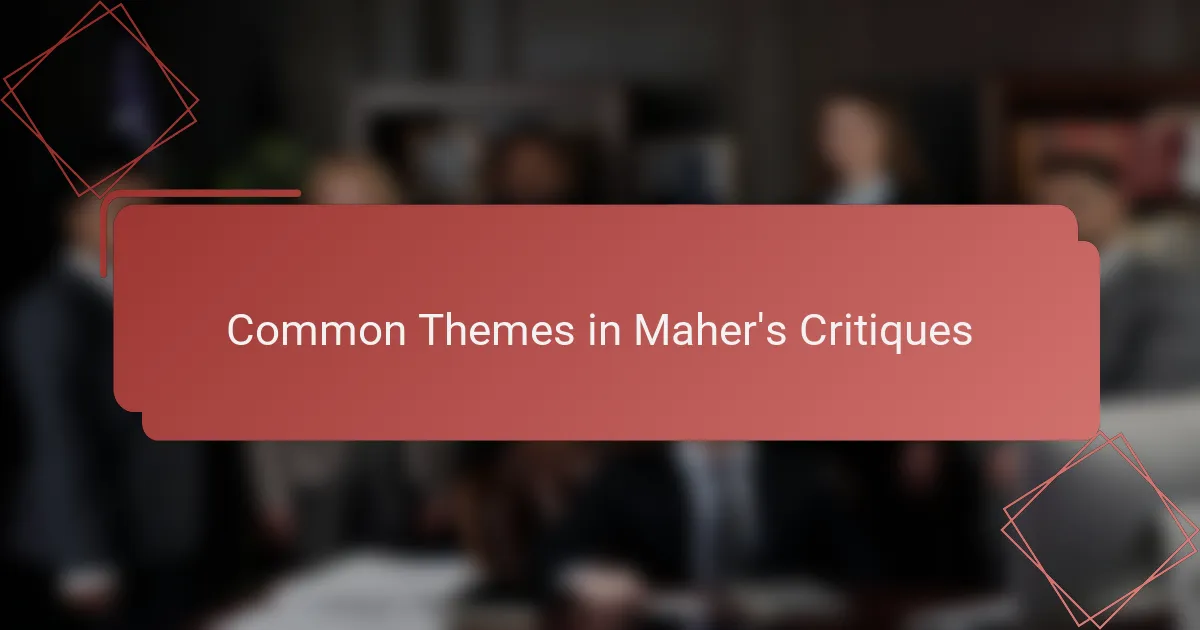
Common Themes in Maher’s Critiques
Bill Maher’s critiques often revolve around a sharp skepticism of political hypocrisy and media sensationalism, themes that I find both refreshing and challenging. I remember watching one of his monologues where his candid remarks about political doublespeak made me question how much of public discourse is just performance rather than genuine debate.
From my experience, Maher consistently targets systemic issues rather than just individual politicians, which makes his satire resonate on a deeper level. His critiques feel personal yet intellectually stimulating, pushing me to reflect on the complexities behind political narratives.
- Political hypocrisy and double standards
- Media sensationalism and misinformation
- The performance nature of political discourse
- Systemic flaws over individual blame
- Encouragement of critical thinking and skepticism
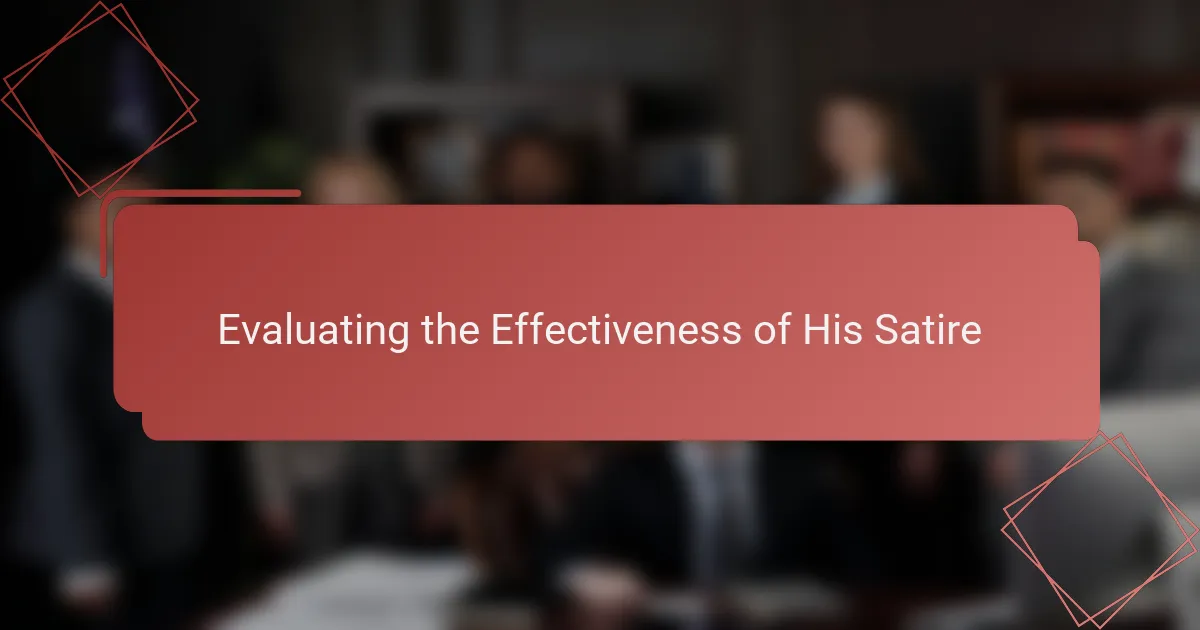
Evaluating the Effectiveness of His Satire
When I evaluate the effectiveness of Bill Maher’s satire, I often find myself torn between admiration and skepticism. Does his humor truly challenge entrenched power structures, or does it sometimes risk reinforcing cynicism without offering solutions? For me, the strength lies in his ability to provoke uncomfortable questions that stay with me long after the laughter fades.
What strikes me most is how Maher’s satire can cut through the noise and make complex political issues feel accessible without losing their seriousness. I recall moments when his biting sarcasm revealed hypocrisies I hadn’t considered before, prompting a mix of amusement and critical reflection. This blend, to me, is what makes his satire impactful rather than just entertaining.
However, I sometimes wonder if his provocations reach only those who already share his views. Does his style create a genuine dialogue across the political divide, or does it merely preach to the choir? Still, from my perspective, the fact that his satire sparks debate—whether in agreement or disagreement—is a testament to its lasting effectiveness.
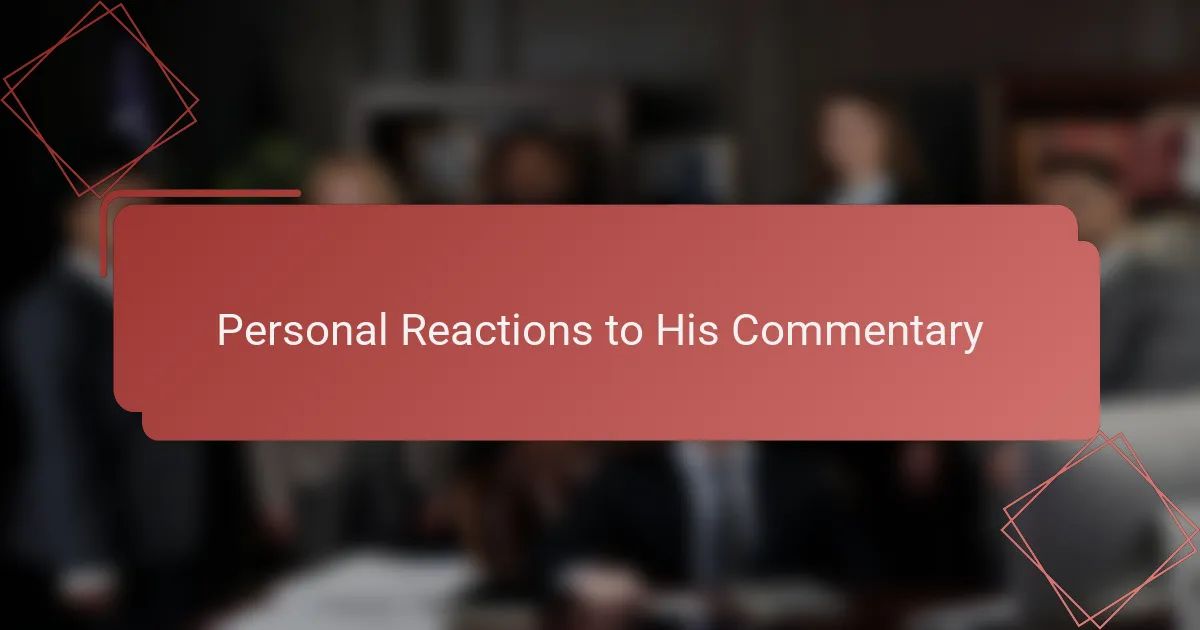
Personal Reactions to His Commentary
Bill Maher’s commentary often leaves me with mixed feelings—on one hand, I appreciate the boldness and clarity he brings to complex political issues. Yet, at times, I catch myself wondering if his sharp delivery overshadows the nuances, making it harder for me to fully embrace his perspective. Have you ever felt that a commentator’s style challenges you but also pushes you away? That tension is something I frequently experience with Maher.
There have been moments when his critiques resonated so deeply that I found myself re-examining my own assumptions. For instance, after one particularly pointed segment on media sensationalism, I noticed how much of the news I consume is filtered through spectacle rather than substance—a realization that hit me harder than I expected. It reminded me that satire, when done well, can be a mirror reflecting uncomfortable truths, and Maher often excels at that.
Still, I can’t deny that sometimes his humor feels like it preaches to the converted. Does his style open doors for genuine dialogue, or does it mostly reinforce existing beliefs? Personally, I wish his commentary sparked more cross-ideological conversation, but even so, I value how it keeps me thinking and questioning long after the show ends.
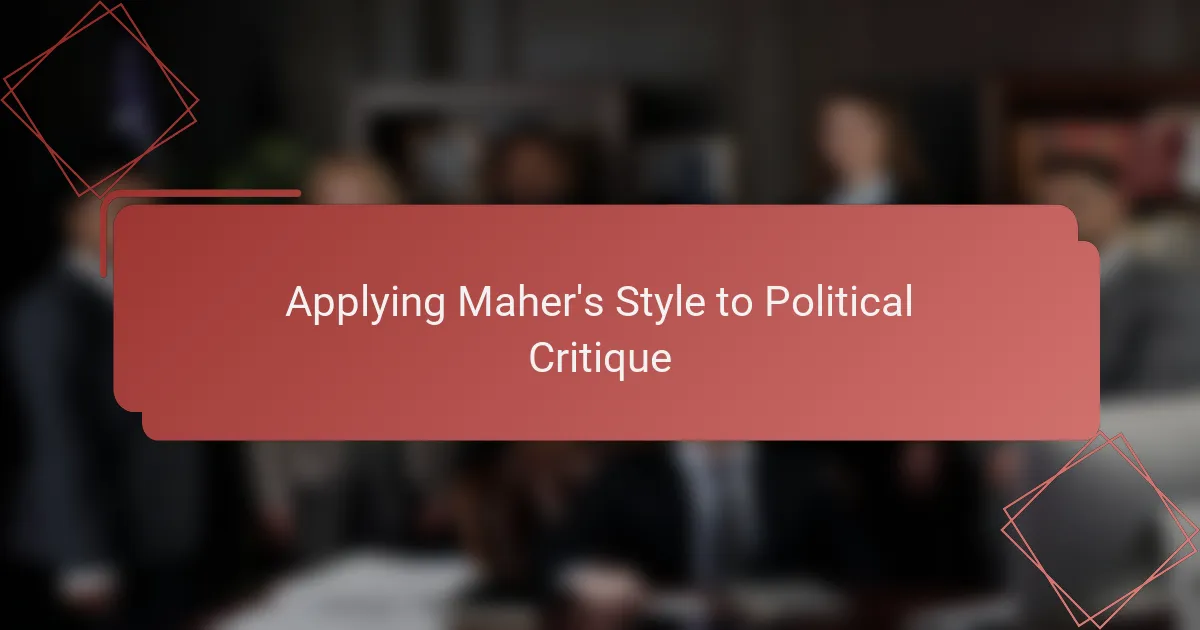
Applying Maher’s Style to Political Critique
Applying Maher’s style to political critique means embracing that fearless blend of humor and confrontation I’ve come to associate with his work. It’s about using sarcasm and irony not just to entertain, but to unmask hypocrisy and challenge accepted political narratives in a way that feels both candid and sharp. When I try this myself, I find that walking this tightrope requires a balance—being bold enough to provoke thought without alienating the audience.
What intrigues me most is how Maher’s conversational tone makes complex issues feel like a personal discussion rather than a lecture. I’ve noticed that when I adopt this style, the critique feels more immediate and relatable, as if I’m sitting across from the viewer inviting them to question alongside me. Have you ever experienced that shift—from preaching to dialogue? That’s the power of his approach.
Yet, applying Maher’s style also raises a challenge I constantly wrestle with: how to push boundaries without simply reinforcing existing biases. In my attempts, I remind myself to challenge all sides, not just the obvious targets, to keep the critique fresh and honest. It’s a fine line, but one that makes political satire meaningful rather than just sarcastic noise.

Lessons Learned from Maher’s Approach
Bill Maher’s approach to political satire taught me the power of blending humor with sharp critique. His willingness to challenge mainstream views, even when unpopular, reminded me how important it is to provoke thought rather than just amuse. I remember watching one of his monologues where his fearless honesty struck a chord, making me reconsider how satire can push boundaries while still fostering dialogue.
What stood out most was Maher’s unapologetic tone, which I found both refreshing and intimidating. It made me realize that effective satire doesn’t shy away from discomfort but embraces it as a catalyst for change.
- Use humor as a tool to provoke deeper reflection, not just laughter.
- Maintain honesty, even if it risks backlash or controversy.
- Challenge popular narratives to spark meaningful conversations.
- Accept that satire may provoke discomfort but view this as a necessary part of impact.
- Balance critique with wit to keep audiences engaged without alienating them.
